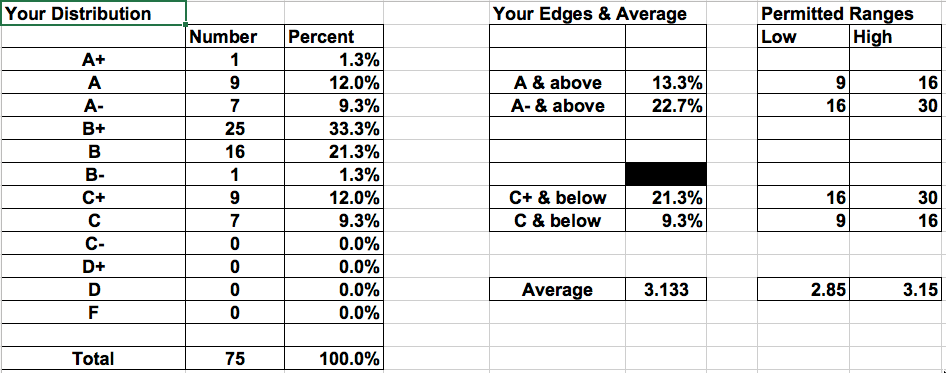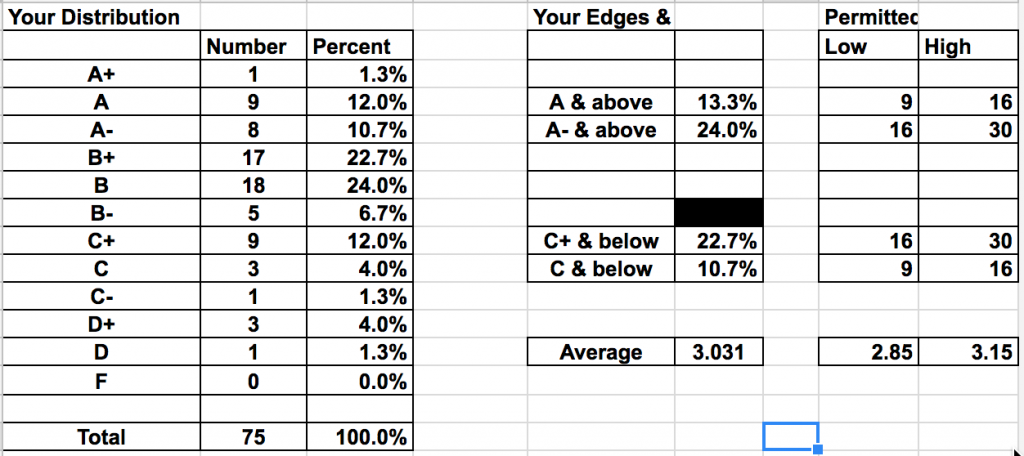Hello everyone. I apologize for interrupting your summer break with this note. I have submitted grades for Property. You can download the exam question, and the A+ paper (If this is yours, please drop me a line!). I am very proud of this class–these are among the highest grades I’ve given yet in Property I.
Here is the distribution for the final exam. The mean was 3.13.

This is a significant improvement from the midterm, where the mean was 3.03.

In this post, I will provide some high-level feedback on the Terminator-themed exam.
Question 1.
1. The first question concerned the ownership of post-apocalyptic Los Angeles following Skynet’s “Judgment Day.” The best answers to this question involved our discussion of acquisition by conquest, stemming from Johnson v. M’Intosh. Some students assessed whether Skynet was civilized or savaged. Other answers incorporated discussions of Locke’s labor theory, as well as those of Pufendorf and Grotius.
2. This question concerned ownership of the man-machine chimera, Arnold. The best answers considered the doctrine of acquisition by creation, which we studied in INS v. AP and White v. Samsung. Further, because Arnold was also created with John’s eternal cells, Moore v. Board of Regents, and the related story of Henrietta Lacks, were on point.
3. This question involved the intellectual property rights of the manual to the time machine, which Arnold memorized and reproduced. Indeed, he improved upon it. These factors were relevant to deciding whether he violated any common law (no statutory patent) claims. INS v. AP and White v. Samsung was also relevant here.
4. This question involved a very, very complex conveyance involving present and future interests for Sarah, John, and John’s father (who we later learn to be Arnold). There were several acceptable answers here, though some stronger than others. First, John has a life estate pur autre vie that is subject to an executory limitation. Several students wrote that he has a fee simple determinable (due to the “so long as”), but his interest is better viewed as an estate that lasts until his father dies. The key point though is that the life estate is itself subject to an executory interest. They’re stacked. Specifically, John’s father has a shifting executory interest. But that is not enough. John’s father’s shifting executory interest is itself subject to a condition subsequent (due to the “but if”). Accompanying that condition subsequent is a right of entry in Sarah. I would also accept that Sarah had a contingent remainder (the heir is ascertained, but there is a condition precedent based on father’s survivorship). With this latter answer, because John is Sarah’s heir, he has a future interest as well. There were other permutations that were also acceptable. This question was designed so that you could explain why the interests line up one way or the other.
5. This policy question asks why in a post-Apocalyptic world property rights are important. The answer to this question concerns our very first week of class, when we discussed why we have property rights. Think of Robinson Crusoe (or Tom Hanks) alone on the island. Property rights serve no purpose. But when another castaway joins him, there is now a fierce competition for scarce resources, and property rules allow them to exist in (relative) harmony. Several students also referenced the Case of the Speluncean Explorers and acquisition by conquest/discovery.
Question 2
1. This question involved a fairly complicated community property question. California, like Texas, does not permit married couples to have joint tenancies in the same sense that common law property states allow. They are what we referred to in class as quasi-joint tenancies. This question takes a few twists and turns due to a possible ouster (locking Arnold out), Arnold’s mortgage (like the opening of a boxing ring), and John’s tenancy in common (which does not interfere with the couple’s joint tenancy).
2. This question called for an application of California’s “pro rata” rule, which concerned some payments made before and after the marriage. Here, the model answer missed the mark, as it applied Texas’s “time of vesting” rule. Five payments ($5,000 total) were made before the marriage. Those are Sarah’s separate property. Five payments ($5,000 total) were made after the marriage with joint assets. In the event of divorce, Sarah would receive her initial $5,000, and half of the joint-payments ($2,500) for a total of $7,500.
3. The ownership of the motorcycle involves several elements. First, Terminator stole it, such that his right is subordinate to the true owner. Second, Terminator promised Arnold that he could have the motorcycle “from my cold dead hands.” Was this an actual inter vivos gift? Or a gift causa mortis, as Arnold unplugged Terminator? Or did he, because Terminator later reanimated? Pardon my mixed 80s references, merging Terminator with the Princess Bride (“As you wish.”). Third, after Arnold is wounded, he promises it to John when he (Arnold) dies. But Arnold goes forward in time to 2029, and does not die for decades. Was this an inter vivos gift or a testamentary gift?
4. Question #4 was the flip side of question #3 from the first part. The answer here in large measure depended on how you handled the prior question. In short, John’s father (Arnold) had died, so the life estate pur autre vie terminated. Sarah had not exercised her right of entry, but that descends to her (only) heir John, who can now enter and claim it in fee simple. If you wrote that Sarah had a remainder, there is no need to enter. (As a side, the question established that John was Sarah’s only living heir, as the remainder of her family was wiped out on Judgment Day).
5. The final question was one asked by a student in class: why bother protecting marital property. We spent several spirited minutes discussing this question, which discussed fairness, efficiency, and equality of the sexes. Stronger answers brought in discussions of coverture, the Married Women’s Property Act, and community property regimes.
Thank you all for a wonderful semester.